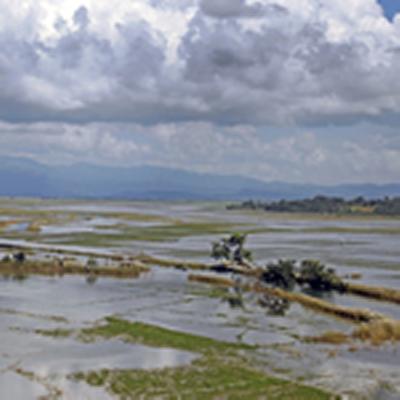Southampton experts add their voice to global climate change risk assessment

Researchers from the University of Southampton have joined an international group of scientists, energy policy analysts, and experts in risk from finance and the military to release a new independent assessment of the risks of climate change, designed to support political leaders in their decisions on how much priority to give to the issue.
Their report argues that the risks of climate change should be assessed in the same way as risks to national security or public health. That means focusing on understanding what is the worst that could happen, and how likely it is to occur.
Southampton scientists Professor Robert Nicholls, Dr Sally Brown and Dr Ivan Haigh contributed their expertise in understanding the consequences of sea-level rise in coastal cities, including the increased likelihood of extreme events and potential limits of adaptation.
In total, the report includes contributions from over 40 scientists, as well as from experts in security, finance, and economics, from 11 different countries.
Professor Nicholls says: “Sea-level rise is an on-going risk to many coastal cities, particularly those which are low-lying and have growing populations. As seen in response from past extreme events, such as Hurricane Katrina in New Orleans which flooded 80 per cent of the city causing 800 deaths and billions of dollars’ worth of damage, a change in the way we defend and protect our cities is going to become increasingly important and challenging in the future. We need to better understand how much sea-level rise cities could cope with.”

The report identifies thresholds beyond which ‘the inconvenient may become intolerable’. These include limits of human tolerance for heat stress, and limits of crops’ tolerance for high temperatures, which if exceeded could lead to large-scale fatalities and crop failure; as well as potential limits to coastal cities’ ability to successfully adapt to rising sea levels. It suggests that these thresholds could become increasingly likely to be crossed over time; an extreme event that may be very unlikely at one point in time could be highly likely at some later point. This will especially be the case if global emissions of greenhouse gases continue to rise, as the report suggests they will in the absence of stronger political commitment and faster technological development.
The report suggests that the largest risks of climate change may be those that are magnified by the interactions of people, markets and governments. It finds that migration from some regions of the world could become ‘more a necessity than a choice’ and that the risks of state failure could rise significantly, affecting many countries simultaneously.
The report recommends that climate change risk assessments should be updated regularly and communicated to political leaders at the highest level.
Speaking at the report’s launch at the London Stock Exchange, Foreign Office Minister Baroness Anelay said, “When we think about keeping our country safe, we always consider the worst case scenarios. That is what guides our policies on nuclear non-proliferation, counter-terrorism, and conflict prevention. We have to think about climate change the same way. Unlike those more familiar risks, the risks of climate change will increase continually over time – until we have entirely eliminated their cause. To manage these risks successfully, it is essential that we take a long-term view, and that we act in the present, with urgency.”
The report, ‘Climate Change: A Risk Assessment’ is available online at: http://www.csap.cam.ac.uk/projects/climate-change-risk-assessment/